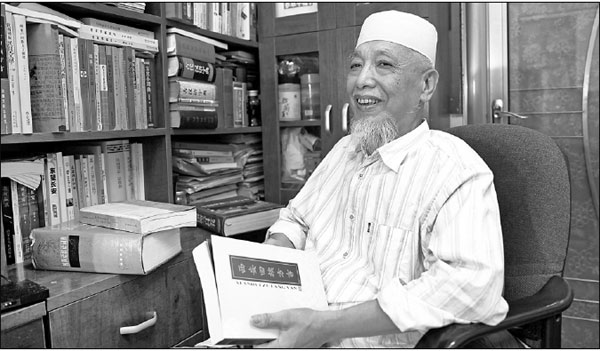Amateur scholar brings a dialect to the fore
Updated: 2016-10-03 08:38
By Huoyanin Xi'An and Li Yang in Beijing(China Daily)
|
|||||||||
Ding Xu's computer is only 2 meters away from his wife's sewing machine, a breadwinner for the family. With the sound of the sewing machine in the background, Ding spent 34 years writing the first book on the roots of Hui people's dialect in Xi'an, Northwest China's Shaanxi province.
At the ceremony to launch the 500-page book in May in Xi'an, many Hui culture scholars, while lauding his work, said Ding had done something they should have done long ago.
"This is a wonderful work on language contact," says Sun Lixin, a researcher at the Shaanxi Academy Social Sciences. Language contact refers to the use of a dialect by people who influence the semantic development of a multiethnic community, according to Sun.
A 68-year-old retired worker today, Ding was born into the oldest Hui community in Qiaozikou in Xi'an and has lived there all his life.
"The Hui community is like a dialect island", Ding says. "People say the Hui ethnic group does not have its own language. What I am doing is trying to tell them that they are wrong, and the Huis not only have a language, but also their language has a long history and has deeply influenced the development of the city."
Attracted as he was to the evolution of Hui people's dialect from childhood, Ding turned his fascination of language into research after he enrolled in a college for adults in 1982 and majored in linguistics. He has an unquenchable thirst for words and expressions, and collected everything related to Hui people's culture, language and history in Xi'an. For about 30 years, Ding always carried a notebook and penned down every expression with Hui characteristics.
"Some words are only used by senior citizens today. When people die, some of the expressions they use die with them." Ding says. "I had to catch them all in time. Some witty remarks carry multiple meanings. Once they disappear, it's like a piece of diamond falling into the sea."
He started sorting his materials and drafting the book after 2003, when he retired from the factory where he worked. In 2004, a relative gifted him a computer. Crippled by high fever at the age of 13, Ding walks with a limp in one leg and has developed a hump, conditions that have aggravated with age. He wrote the book on the computer sitting on a wheelchair.
"I am a slow-witted person, so it took me decades to complete the march (which others could have covered in a few years)," Ding says. He loves French writer Honore de Balzac and is determined to become a historian of the Hui language.
"He seemed exhausted when he first held the book," says his wife. "He exhausted his energy writing the book."
Apart from conducting field research, Ding also learned Persian, Arabic, Turkish, Mongolian, Tibetan and Manchurian languages, which have played important roles in the development of Hui people's dialect in Xi'an.
liyang@chinadaily.com.cn
The Hui people in China are an ethnic group made up of many sub groups, which include Uygurs, Kazaks, Arabs, Persians, Turks, Hans, Manchus and Mongolians, and believe in Islam. "The Hui people are an example of successful inter-ethnic fusion in China. Their dialect in Xi'an is a mixture of many languages, with the Chinese language as a base. Their dialect reflects their wisdom, humor and history," Ding says. For example, gangchuo means a leg in Hui people's dialect in Xi'an, a word that has its origin in a noun in Persian language which means "walking stick" and has a similar pronunciation.
"The Hui people's dialect in Xi'an is like a pearl in the treasure trove of Chinese culture and an important dialect of Northwest China. It has historical, cultural, ethnic and religious characteristics. And I have tried to highlight these characteristics."
Fa Dima, a Hui resident in Xi'an interested books, says: "Ding's book is easy reading. It reminds me of my childhood that I spent in my grandparents' home." She adds: "I didn't realize many words had disappeared from my vocabulary till I read Ding's book. It looks like a book on the Hui people. But it's a book for the world."
|
Ding Xu, a 68-year-old physically-challenged retired worker from the Hui ethnic group, holds the book he authored on Hui people's dialect. He spent more than 30 years writing the book, at his home in one of the oldest Hui communities in Xi'an, Shaanxi province.Huo Yan / China Daily |
Today's Top News
China seeks UK nuclear approval after Hinkley deal
E-wallet services bloom at airports
British retailers brace for rush during Golden Week
1 dead, 26 missing in East China landslide
MH17 missile came from Russia:Investigation
Sheffield research to help China's space plan
Royal couple continue their charmed tour in Canada
Russia unveils Syria truce deal with US
Hot Topics
Lunar probe , China growth forecasts, Emission rules get tougher, China seen through 'colored lens', International board,
Editor's Picks

|

|

|

|

|

|








